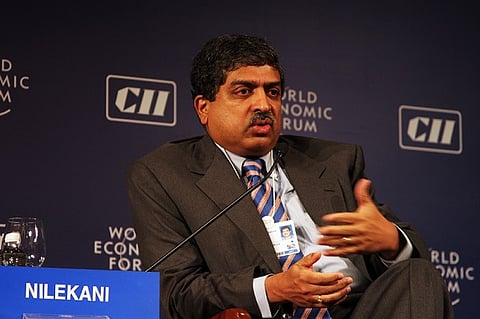

The unique identity number given to over a billion Indians by the Aadhaar card had helped India save $9 billion in preventing misuse of its beneficiary welfare schemes, said its architect Nandan Nilekani.
"By having a unique number, you eliminate fakes and duplicates from your beneficiary and employee lists. That alone has saved the government $9 billion," said Nilekani at a World Bank panel discussion on 'Digital Economy for Development' here on Thursday.
Nilekani, 62, co-founder and Chairman of Indian IT major Infosys, steered the world's largest digital identity number project launched in 2009 by the then Congress-led UPA government and supported by the NDA government led by Prime Minister Narendra Modi.
"It has really been a bipartisan thing. I was given a mandate by then Prime Minister Manmohan Singh on how to give everyone in India a unique digital ID. We have 1.18 billion in the system we have built with an architecture that could enroll 1.5 million people a day at 35,000 stations across the country," he said.
As the first Chairman of the Unique Identity Development Authority of India (UIDAI), Nilekani guided the ambitious Aadhaar project for five years till mid-2014.
"We also have half a billion (500 million) people who have connected their (Aadhaar) ID to their bank accounts. The government has transferred about $12 billion to their accounts electronically real time, which is the world's largest cash transfer system in real-time, Nilekani said.
Admitting that he was a great believer in digital economy for development, he said in the developing countries where there was no legacy systems, it was easier to build systems that could leapfrog.
"The notion of what is digital infrastructure has to move. We think about it as providing communication and internet, which are basic. In the new world of the data economy, identity, authentication, frictionless payments and paperless transactions are important layers of the new digital economy," he reiterated.
Noting that India was the only country where a billion people do paperless, cashless transactions on their mobile phones using the Aadhaar infrastructure, Nilekani said lower transaction cost would lead to more inclusion.
"The infrastructure India has created enables every individual to use one's own data for his/her advancement in personal life, which is fundamental. A small merchant who couldn't get a loan earlier can use his digital footprint to get it now. There's an inversion happening about the way we think about data for personal advancement," he said.
On the Supreme Court's ruling on the right to privacy, Nilekani said the apex court had recognised it as a fundamental right, but laid down a framework to circumscribe some of the privacies for achieving a state objective -- national security, prevention of crime, protection of revenue or for social welfare.
"The Supreme Court, however, said every time you circumscribe some privacies, there has be a certain law, it needs to be reasonable. It's a brilliantly drafted judgement," he said.
The panel discussion was held on the margins of the annual meeting of the World Bank and the International Monetary Fund (IMF) in the US capital.